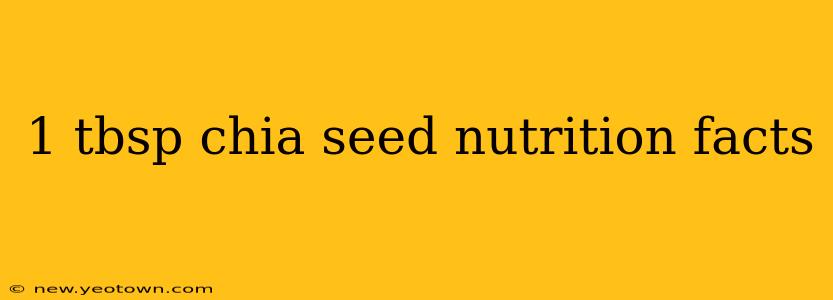Unlocking the Nutritional Powerhouse: A Deep Dive into 1 Tablespoon of Chia Seeds
Chia seeds, those tiny, obsidian-like wonders, have exploded in popularity, and for good reason. Packed with nutrients, they're a superfood deserving of the hype. But what exactly are you getting when you sprinkle that single tablespoon into your yogurt, smoothie, or baked goods? Let's delve into the nutritional details of this tiny but mighty seed.
What are the nutritional benefits of 1 tablespoon of chia seeds?
One tablespoon of chia seeds (approximately 10 grams) offers a surprisingly impressive nutritional profile. It's a concentrated source of fiber, protein, healthy fats, and various essential minerals and antioxidants. Think of it as a mini-nutritional powerhouse you can easily incorporate into your daily diet. We're talking sustained energy, improved digestion, and a boost to your overall well-being. This isn't just about trendy health food; it's about fueling your body with quality nutrients.
How many calories are in 1 tbsp of chia seeds?
A single tablespoon of chia seeds contains approximately 60-70 calories. This is relatively low considering the abundance of nutrients you’re receiving. These calories primarily come from healthy fats, providing sustained energy without the blood sugar spike of refined carbohydrates. This makes them an excellent addition to any diet focused on weight management or balanced nutrition.
What are the macronutrients in 1 tbsp of chia seeds?
The macronutrient breakdown is another key aspect of understanding the nutritional value. A tablespoon typically provides roughly:
-
Fiber: Around 2-3 grams of fiber, contributing significantly to daily fiber intake. This promotes healthy digestion, regulates blood sugar levels, and helps maintain satiety (feeling full).
-
Protein: Approximately 1-2 grams of protein, contributing to overall protein needs, particularly important for vegetarians or vegans looking for plant-based protein sources.
-
Fat: Around 4-5 grams of fat, primarily healthy unsaturated fats, which are crucial for heart health and various bodily functions. These fats contribute to feeling full and satisfied.
What vitamins and minerals are in 1 tbsp of chia seeds?
Beyond the macronutrients, chia seeds are rich in various micronutrients, including:
-
Calcium: A good source of plant-based calcium, important for strong bones and teeth.
-
Phosphorus: Essential for bone health, energy production, and various metabolic processes.
-
Magnesium: Crucial for muscle function, nerve transmission, and blood sugar control.
-
Manganese: An antioxidant that plays a role in bone health and wound healing.
-
Antioxidants: Chia seeds contain various antioxidants, helping to protect your cells against damage from free radicals.
Are there any potential side effects of eating chia seeds?
While generally safe for consumption, consuming large quantities of chia seeds can lead to some potential side effects. Because of their high fiber content, consuming too many too quickly could lead to digestive discomfort such as bloating, gas, or constipation. It's always advisable to start with small portions and gradually increase your intake to allow your body to adapt. Staying well-hydrated is also crucial when consuming chia seeds as they absorb liquid.
How can I incorporate 1 tbsp of chia seeds into my diet?
The possibilities are endless! You can sprinkle them over yogurt, oatmeal, salads, or smoothies. They can be added to baked goods for a nutritional boost and added texture. You can even soak them in water or milk to create a chia seed pudding, a delicious and healthy dessert or breakfast option. Experiment and discover your favorite way to enjoy the benefits of this amazing seed.
This detailed exploration hopefully sheds light on the nutritional value of just one tablespoon of chia seeds. Remember, incorporating small, consistent changes to your diet can significantly impact your overall health and well-being. So next time you reach for that tablespoon, remember the nutritional powerhouse you are adding to your meal!

